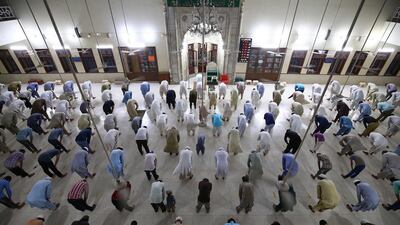I write to you in reference to Ben Farmer's article Coronavirus: Pakistan lifts bans on mosque prayers for Ramadan (April 19): they should open the mosque but for a limited number of people. Rules to maintain distance must be obeyed and everyone must wear masks. Also, children and old people should not be allowed in the mosque.
Rukhsana Waseem, Dubai
The virus is highly contagious and it does not pick and choose who it will infect. I absolutely hate that we are restricted from the mosque but this is about our overall health and well-being. We can pray with our families and still enjoy Ramadan activities. It will not be with the community but at least it's something.
Feda Jarad, Abu Dhabi
We need to get used to the new normal
With reference to Damien McElroy's piece Coronavirus: What is the risk in extending a lockdown indefinitely? (April 18): extending lockdowns indefinitely will have adverse psychological impact on people. Daily wage earners will face desperate times. As lockouts are lifted, we have to understand that life can never go back to the earlier normal, till a vaccine is found, which may take up to 18 months. So our current way of living and working, with some relaxations, may be the new normal.
We may have to wear masks outside our homes, practice social distancing, avoid large groups at work or recreation, etc. Even if bars and restaurants are permitted to re-open, we may have to sit at appropriate distances. Cars, trains and planes, may have to carry fewer passengers. Schools and colleges may continue holding classes online. Offices may have to operate with reduced manpower with many staff members working from home. Getting part-time domestic help may become a problem and we may have to learn to do more ourselves in terms of basic functions like cleaning, cooking, etc. Thus, the world post-lockdown world could be more demanding and we may not return to our earlier way of living – for some more months.
Rajendra Aneja, Dubai
Horses on the street are a sight for sore eyes – and ears
In reference to a video posted on The National's Facebook page, Dubai Police horses patrol the streets to keep residents safe from Covid-19. I hope they pass by Muhaishnah, my daughter would be thrilled to see the cops riding horses on the streets.
Sayed Aish Sayed, Dubai
Protests, health care workers and a sad state of affairs in the US
Regarding the report Coronavirus latest: Protests erupt in US over stay at home orders (April 20): protests in the US demanding that the Trump administration lift stay at home orders, which they say is against their rights, is incomprehensible. The US has the most number of deaths due to coronavirus and yet people are demanding to be allowed to leave their homes – it's a sad state of affairs that health care workers had to counter protests. It shows the protesting US citizens' narrow understanding of risk.
K Ragavan, Bengaluru, India

